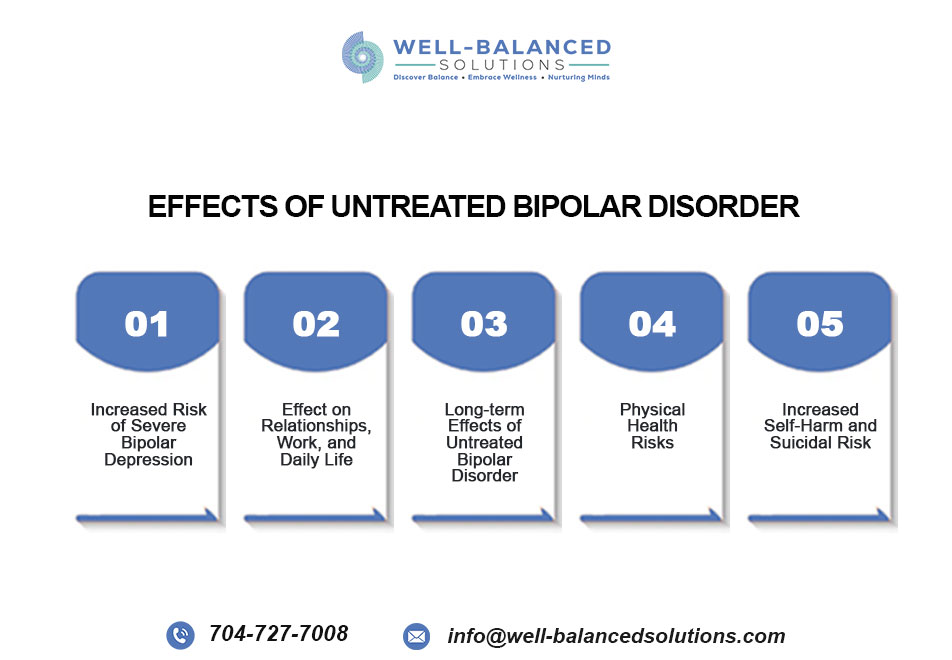Bipolar disorder is a complex mental health condition characterized by extreme mood swings, from manic highs to depressive lows. According to the NIMH, it affects approximately 40 million people worldwide and 2.8% of U.S. adults annually. If left untreated bipolar disorder can significantly impact daily life and overall well-being.
This disease can mess up your daily life, relationships, and health as a whole. Studies show that about 60% of people with bipolar disorder are not properly diagnosed or are given the wrong diagnosis for up to 10 years. If they are not treated, this can have very bad effects.
Finding the problem early and getting professional Telephycartric help is very important for controlling symptoms and stopping the condition from getting worse. With proper therapy, medication, and lifestyle adjustments, individuals can lead stable, fulfilling lives.
In this blog, we’ll explore the Untreated Bipolar Disorder symptoms, different types of bipolar disorder, and the risks of leaving it untreated. Stay informed and take charge of your mental health!
Understanding Bipolar Disorder
Bipolar disorder is a mental illness marked by significant shifts in mood, such as manic episodes (high energy, impulsivity, and happiness) and depressive episodes (low energy, sadness, and hopelessness). They can change your daily life, relationships, and work.
Bipolar I, Bipolar II, and Cyclothymic illness are different types of illness based on how bad the mood episodes are and how long they last.
Genetics, brain chemistry, and environmental triggers are some of the things that play a part, but the exact reason is still unknown. Medication, therapy, and managing your lifestyle are common parts of treatment.
Common Signs of Bipolar Disorder
Manic Episodes (Bipolar I)
- Excessive energy and restlessness
- Decreased need for sleep
- Racing thoughts and rapid speech
- Impulsivity and risk-taking
- Feelings of grandiosity
Hypomanic Episodes (Bipolar II):
- Milder mania with increased energy
- Heightened mood and confidence
- Mild impulsivity
Depressive Episodes (Both Types)
- Persistent sadness or hopelessness
- Fatigue and lack of motivation
- Difficulty concentrating
- Sleep disturbances
- Suicidal thoughts
The Importance of Proper Treatment for Bipolar Disorder
Millions of people around the world have bipolar disorder, which is a dangerous mental illness. People may have severe mood swings that can affect their personal and work lives if they don’t get the right treatment. Luckily, people can control their symptoms and live stable lives with the help of effective treatments like medicine, therapy, and online treatment programs.
Risk Factors Of Untreated Bipolar Disorder
Bipolar illness can have serious effects on both mental and physical health if it is not treated. People may have serious mood swings, act on impulses more often, and have trouble keeping relationships or jobs.
Without the right help, the chances of abusing drugs, having unstable finances, and having suicidal ideas increase. Not taking care of bipolar disorder can also make other health problems worse, like heart disease and memory loss.
To lower these risks and make life better generally, it’s important to get a diagnosis early and stick with treatment, which may include medication and therapy.
Effects of Untreated Bipolar Disorder
Not getting treatment for bipolar disorder can have bad effects on your mental health, your relationships, and your daily life.

Lack of therapy for bipolar disorder might intensify mood swings, impulsivity, and emotional suffering. Intense depression episodes can cause hopelessness, suicidal ideation, and self-harm. Mania can cause reckless behavior that endangers people.
Increased Risk of Severe Bipolar Depression
Chronic, untreated bipolar disease causes longer, more severe depressive episodes. Self-isolation, substance misuse, and suicide are increased by these crises’ difficulty to manage without medical care. Untreated bipolar disorder increases the chance of suicide, according to research.
Effect on Relationships, Work, and Daily Life
Family, friends, and work connections can be severely affected by bipolar disorder. Mood swings, impulsivity, and emotional instability can cause confrontations, social retreats, and misunderstandings. Untreated bipolar disease can impair productivity, decision-making, and reliability at work, raising the risk of job loss or financial instability.
Long-term Effects of Untreated Bipolar Disorder
Chronic bipolar disease causes significant mood changes, including manic and depressed episodes. Bipolar disorder patients without treatment may suffer long-term health, cognitive, and mental health issues.
Physical Health Risks
Untreated bipolar disorder can lead to harmful lifestyle patterns and dangerous medical concerns. High stress, irregular sleep, and poor diets associated with the illness increase the risk of cardiovascular problems like hypertension, obesity, and metabolic syndrome. Chronic stress and sleep problems impair the immune system, making infections and chronic illnesses more likely.
Increased Self-Harm and Suicidal Risk
Self-harm and suicide are major concerns with untreated bipolar disease. People with severe depressive or mixed episodes frequently feel hopeless, worthless, and despair.
Studies indicate that patients with untreated bipolar disorder are at a significantly higher risk of suicide compared to the general population. Nearly 20% to 30% of people with bipolar disorder attempt suicide at least once in their lifetime.
Factors Worsening Bipolar Disorder Symptoms
Bipolar disorder severity can increase due to genetic and environmental influences, as well as stress and trauma.
Genetic and Environmental Influences
- A family history of mental illness raises the risk and severity of symptoms.
- Early childhood trauma, such as abuse or neglect, can worsen the condition.
Stress and Trauma Triggers
- Major life changes (job loss, divorce, financial instability) can destabilize moods.
- Emotional trauma (losing a loved one) may trigger manic or Lack of Access to Bipolar Disorder Treatment
- Without proper treatment, individuals with bipolar disorder are at greater risk of experiencing severe and prolonged episodes.
Barriers to treatment include
- Financial Constraints
- Limited Mental Health Resources
- Stigma Surrounding Mental Illness
Benefits of Therapy and Counseling
Bipolar disorder management requires medication and therapy for emotional and psychological support. Addressing triggers, creating coping skills, and enhancing connections help people manage their illnesses.
Key Benefits of Therapy
- Identifying Triggers
Therapy helps people figure out what thoughts, events, or sources of stress might be causing their mood swings. By knowing what sets off these reactions, they can take steps to lessen their effects.
- Developing Coping Strategies
Through therapy, patients learn effective techniques to manage stress, anxiety, and depressive symptoms. This includes mindfulness, relaxation exercises, and structured problem-solving approaches.
- Enhancing Relationships
Therapy helps people communicate better, which makes it easier for them to handle personal and professional situations. It helps people control their emotions and work out their differences, which makes relationships stronger.
Effective Therapeutic Approaches To Treat Bipolar Disorder
- Cognitive-behavioral therapy (CBT)
- Dialectical Behavior Therapy (DBT)
- Psychoeducation
The Bottom Line
Proper bipolar disorder medication and therapy treatment are vital for keeping a healthy and satisfying life. If Bipolar disorder is left untreated it can cause mood swings, marital issues, and job and school disruptions. Seeking support from a mental health expert can greatly improve symptoms and general mental wellness.
Get help right away if you have bipolar illness. Well-Balanced Solutions and Mental Health Wellness Center provides personalized psychiatric care, therapy, and online bipolar treatment. Start mental wellness and stability today by contacting WellBalance Mental Wellness Center.
Resources Links:
Untreated Bipolar Disorder | 20 Surprising Physical Symptoms







